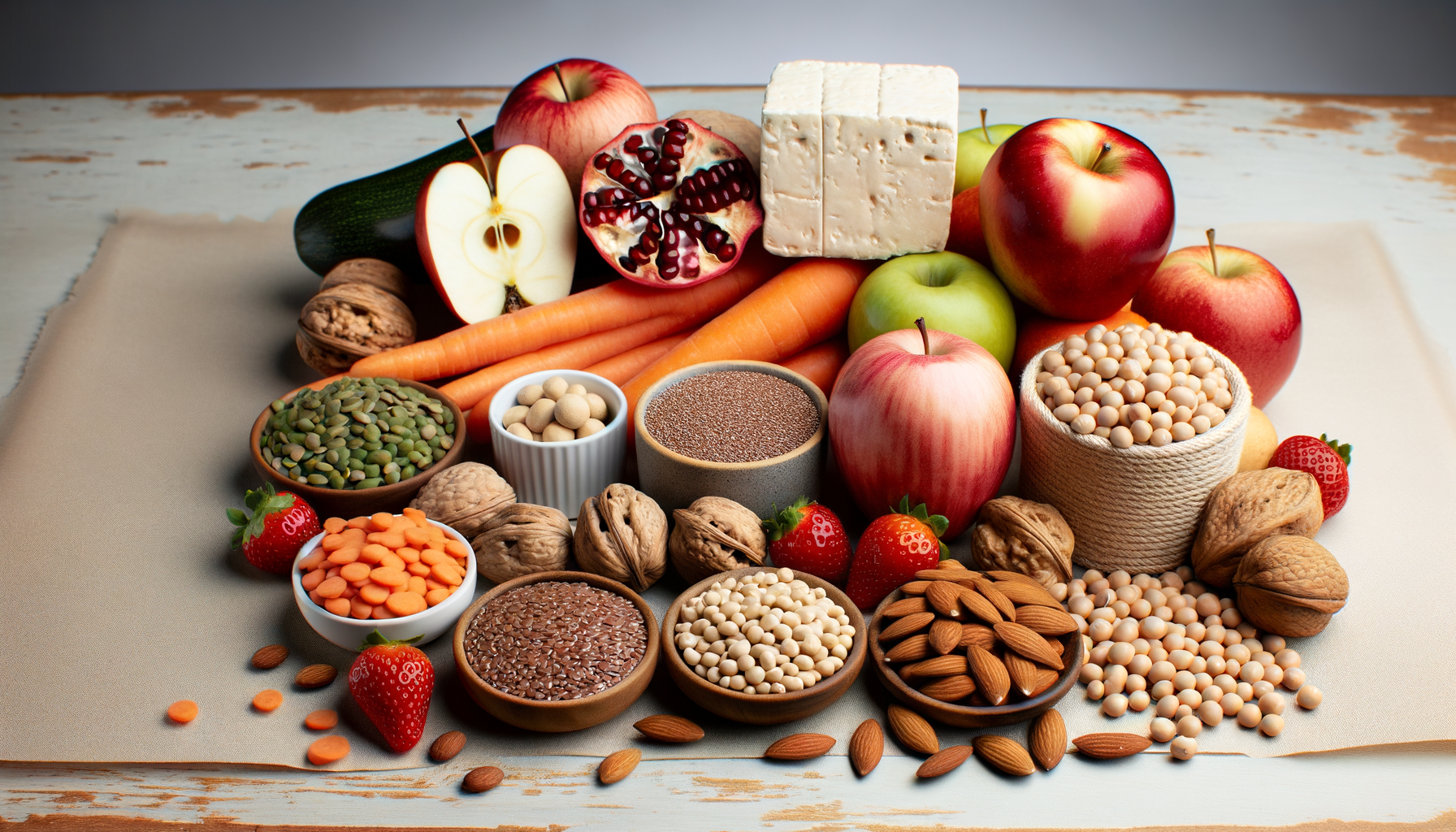Introduction to Phytoestrogens
Phytoestrogens are naturally occurring compounds found in a variety of plants and the foods derived from them. These substances have a chemical structure that is similar to the estrogen produced by the human body, and they can exert estrogen-like effects when ingested. Commonly found in fruits, vegetables, legumes, and some grains, phytoestrogens are often referred to as dietary estrogens due to their presence in food.
Historical Context and Usage
The use of phytoestrogens dates back centuries, with historical evidence suggesting that they were consumed as part of traditional diets in many cultures. Their potential health benefits have been recognized in various forms of traditional medicine, and they have been used to treat a range of conditions, particularly those related to hormonal imbalances and menopause.
Comparison with Body’s Natural Estrogen
Phytoestrogens imitate the body’s natural estrogen by binding to estrogen receptors, although they do not bind as strongly. This can result in weaker estrogenic effects compared to the body’s own hormones. Despite this, they can still influence hormonal balance and have been studied for their potential to alleviate symptoms associated with reduced estrogen levels, such as those experienced during menopause.
Sources of Phytoestrogens in Diet
The diet is a rich source of phytoestrogens, particularly when it includes a variety of plant-based foods. Soy products, such as tofu, tempeh, and miso, are among the most well-known sources. Other foods high in phytoestrogens include flaxseeds, sesame seeds, nuts like almonds and walnuts, as well as fruits and vegetables such as apples, carrots, and yams. Whole grains and legumes also contribute to dietary intake of these compounds.
While phytoestrogens can be obtained through supplements, obtaining them from natural food sources is generally considered a better choice due to the additional nutrients and fiber these foods provide. As research continues to explore the health implications of phytoestrogens, it is important to consider both their potential benefits and risks in the context of a balanced diet.
Health Benefits of Phytoestrogens
Menopausal Symptom Relief
Phytoestrogens have been studied for their potential to alleviate symptoms associated with menopause, such as hot flashes. A 2014 study found that phytoestrogens reduced the frequency of hot flashes in menopausal women without serious side effects, suggesting that these plant-based compounds may offer a natural alternative to hormone replacement therapy.
Bone Health and Osteoporosis Prevention
Estrogen deficiency following menopause can negatively impact bone health, leading to conditions like osteoporosis. Phytoestrogens may serve as a natural remedy for maintaining bone strength. A 2011 study indicated that phytoestrogens helped combat postmenopausal osteoporosis, although potential side effects were noted, warranting caution and further research.
Menstrual and Hormonal Regulation
Phytoestrogens may help balance hormone levels during menstrual cycles, potentially offering relief from symptoms caused by fluctuating estrogen levels. However, more research is needed to support the use of phytoestrogens for menstrual regulation.
Skin Health and Acne Treatment
Phytoestrogens might play a role in combating acne by rebalancing hormone levels. A 2017 study partially supports the theory that phytoestrogens can help treat acne, but conclusive evidence is still needed to recommend phytoestrogens as an effective treatment.
Cancer Prevention and Management
Some studies suggest that phytoestrogens could be beneficial in fighting hormonal cancers, such as breast cancer. Research from 2009 and 2015 found that consuming soy foods, which are rich in phytoestrogens, decreased the risk of death and recurrence in women with breast cancer. However, the role of phytoestrogens in cancer survival is complex and depends on various factors, including menopausal status.
Cardiovascular Health Improvement
Phytoestrogens may support heart health. A 2016 study found that phytoestrogens helped treat arterial conditions and improve heart health in postmenopausal women. While phytoestrogens may provide similar benefits to synthetic estrogen used in hormone replacement therapy, they may also carry similar risks, necessitating further investigation.
In conclusion, phytoestrogens present in a plant-based diet may offer a range of health benefits, particularly for premenopausal and postmenopausal women. However, the potential risks associated with high levels of phytoestrogens are not yet fully understood, and their side effects may be similar to those of synthetic estrogen. It is generally considered healthful to consume a plant-based diet, and many plant foods contain phytoestrogens. More research is needed to fully understand how phytoestrogens work and whether consuming them in high levels carries any health risks.
Potential Risks and Side Effects
Endocrine Disruption and Hormonal Imbalance
Phytoestrogens, while beneficial for some, can act as endocrine disruptors, interfering with the body’s hormonal balance. These plant-derived compounds mimic estrogen, binding to the same receptors as the body’s own hormones. However, their weaker binding can lead to both under- and over-estrogenic effects, potentially causing hormonal imbalances. This can be particularly concerning for individuals with hormone-sensitive conditions or those undergoing hormonal therapies.
Cancer Risks and Controversies
The relationship between phytoestrogens and cancer risk is complex and controversial. On one hand, some studies suggest that phytoestrogens may have a protective effect against certain hormone-dependent cancers, such as breast cancer. On the other hand, due to their estrogen-like activity, there is concern that high intake of phytoestrogens could stimulate the growth of estrogen-responsive tumors. The impact appears to be dose-dependent and may vary based on an individual’s hormonal status and the timing of exposure.
Reproductive Health Concerns
Phytoestrogens can influence reproductive health, with potential effects on fertility and reproductive development. High levels of phytoestrogens, particularly during critical developmental windows, may disrupt the normal functioning of the reproductive system. For example, exposure to phytoestrogens in utero or during early life has been linked to altered reproductive organ development and later-life fertility issues in some animal studies.
Weight and Metabolism Implications
While phytoestrogens have been studied for their potential role in weight management, their effects on metabolism are not fully understood. Some research suggests that phytoestrogens may influence fat accumulation and metabolism, potentially affecting body weight. However, the evidence is not conclusive, and more research is needed to understand the implications of phytoestrogen consumption on weight and metabolic health.
Note: The potential risks and side effects of phytoestrogens vary widely among individuals, and the long-term health implications are not yet fully understood. It is essential for consumers to approach phytoestrogen intake with caution and to consult healthcare professionals, especially in the case of existing health conditions or concerns.
By the way, something for you, a little gift!!!
I am just in the middle of publishing my book. It’s about How women can balance their hormones. One part is about food and diet, of course.
Follow this link and enter your email.
I will send you this part of the book for free once the book is published. It has many concrete, practical tips and recipes and will help you feel better during menopause or times of Big hormonal fluctuations.
Annette, Damiva Lead for Health & Wellness

Phytoestrogens in Foods
Nuts and Seeds High in Phytoestrogens
Nuts and seeds are not only nutritious but also a rich source of phytoestrogens, particularly lignans. Among the most potent in phytoestrogen content are flaxseeds, which can be easily incorporated into the diet by adding them to smoothies, oatmeal, or baked goods. Other notable nuts and seeds include sunflower seeds, sesame seeds, almonds, and walnuts. These can be enjoyed as snacks or used to enhance the flavor and nutritional profile of various dishes.
Fruits and Vegetables Rich in Phytoestrogens
Fruits and vegetables are essential components of a healthy diet and some are particularly rich in phytoestrogens. Apples, carrots, pomegranates, strawberries, cranberries, and grapes are fruits known for their higher phytoestrogen content. Vegetables such as yams, lentils, alfalfa sprouts, and mung beans sprouts also contain these beneficial compounds. Incorporating a variety of these fruits and vegetables into your diet can help you take advantage of the phytoestrogens they offer.
Soy Products and Their Phytoestrogen Content
Soy products are perhaps the most well-known sources of phytoestrogens, specifically isoflavones. Foods such as soybeans, tofu, tempeh, miso soup, and miso paste are not only high in protein but also rich in phytoestrogens. These soy products can be used in a variety of culinary applications, from main dishes to condiments, providing a plant-based alternative to animal proteins.
Herbs and Beverages Containing Phytoestrogens
Certain herbs and beverages are known to contain phytoestrogens. Herbs such as red clover and licorice root have been used in traditional medicine and can be consumed as teas or supplements. Beverages like coffee, bourbon, beer, red wine, and oils like olive oil and jasmine oil also contain varying levels of phytoestrogens.
Grains and Legumes as Sources
Grains and legumes are staple foods in many cultures and provide a source of phytoestrogens. While not as concentrated in phytoestrogens as some other foods, they can still contribute to the overall intake of these compounds. Including a variety of grains and legumes in your diet, such as barley, rye, and different types of beans, can help ensure a balanced intake of phytoestrogens along with other essential nutrients.
In conclusion, phytoestrogens can be found in a wide range of foods, from the seeds we sprinkle on our breakfast to the vegetables we include in our dinners. By understanding the sources of these compounds and incorporating them into our diets, we can potentially reap the health benefits they offer while enjoying a diverse and nutritious diet.

Research and Studies on Phytoestrogens
Analysis of Recent Clinical Trials
Recent clinical trials have provided valuable insights into the potential health benefits and risks associated with phytoestrogen consumption. A 2014 study focusing on menopausal women found that phytoestrogens reduced the frequency of hot flashes without serious side effects. Another 2011 study highlighted the potential of phytoestrogens in combating postmenopausal osteoporosis, although the researchers noted possible side effects and the lack of FDA regulation for phytoestrogens. The role of phytoestrogens in cancer prevention and management has also been a subject of interest, with mixed results. While some studies, including one from 2009, suggest a beneficial role in decreasing the risk of death and recurrence in breast cancer patients, others indicate a complex relationship dependent on menopausal stage and cancer type.
Long-Term Effects and Observational Studies
Observational studies have provided a broader perspective on the long-term effects of phytoestrogens. A 2016 study linked phytoestrogens to improved heart health in postmenopausal women. However, the long-term effects on reproductive health remain controversial. A 2010 study raised concerns about high levels of soy affecting ovarian function, emphasizing the need for more comprehensive research to understand the full impact of phytoestrogens over time.
Comparative Studies with Synthetic Estrogen
Comparative studies have examined the similarities and differences between phytoestrogens and synthetic estrogen. Phytoestrogens mimic estrogen due to their similar chemical structure, but they do not bind to estrogen receptors as firmly, potentially resulting in weaker effects. Studies suggest that phytoestrogens may offer similar benefits to synthetic estrogen used in hormone replacement therapy, but the safety profile is not yet fully understood, and they may carry similar risks.
Gaps in Current Research
Despite the growing body of research, significant gaps remain in our understanding of phytoestrogens. The health risks of consuming high levels of phytoestrogens are not fully understood, and the side effects may be similar to those of synthetic estrogen. The bioavailability and pharmacokinetics of isoflavones, a class of phytoestrogens, are influenced by food texture and form, highlighting the need for further research on dietary sources and their health implications. Additionally, the ability to convert phytoestrogens to active metabolites like equol varies among individuals, suggesting a role for genetics and diet that warrants further exploration.

Popular Read
Guidelines for Consumption
Recommended Dietary Intake
The recommended dietary intake of phytoestrogens varies depending on individual health status, age, and sex. For adults, a daily intake of 40-70 mg of isoflavones is suggested to achieve potential health benefits. This is consistent with the average consumption in Asian societies, where dietary intake ranges from 15-50 mg per day. In contrast, Western diets typically provide only about 2 mg per day. It is important to note that these recommendations are based on dietary sources of phytoestrogens, such as soy products, rather than supplements.
Considerations for Supplement Use
While phytoestrogens are available in supplement form, obtaining these compounds from natural food sources is preferable due to the complexity of food matrices and the presence of other beneficial nutrients. If considering supplements, it is essential to choose products from reputable manufacturers to ensure quality and accurate labeling. Dosage should be carefully monitored to avoid excessive intake, which may lead to adverse effects.
Special Populations and Precautions
Special populations, including pregnant women, breastfeeding mothers, individuals with hormone-sensitive conditions, and those with compromised thyroid function, should exercise caution with phytoestrogen consumption. In these cases, consultation with a healthcare professional is strongly advised. Additionally, parents considering soy-based formulas for infants should be aware of the high phytoestrogen content and potential long-term effects on reproductive health and development.
Consulting Healthcare Professionals
Before initiating any significant dietary changes or supplement use, consulting with a healthcare professional is crucial. This is particularly important for individuals with pre-existing health conditions, those taking medications that may interact with phytoestrogens, and women who are pregnant or planning to become pregnant. A healthcare professional can provide personalized advice based on an individual’s health history and current medications.
In conclusion, while phytoestrogens may offer various health benefits, their consumption should be approached with consideration of individual health needs and potential risks. Adhering to recommended dietary intakes, preferring natural food sources over supplements, and seeking professional guidance can help balance the benefits and risks associated with phytoestrogen consumption.
Do you know the three main ways that your body gets in touch with harmful chemicals with everyday products? Knowledge is Power!
The Ultimate Detox Guide will tell you how to lower your exposure to harmful chemicals!

Conclusion and Future Perspectives
Summary of Phytoestrogens’ Role in Health
Phytoestrogens, plant-derived compounds structurally similar to estrogen, have been a subject of interest due to their potential health benefits and risks. They are found in various foods, including soy products, nuts, seeds, and whole grains. Phytoestrogens can mimic or modulate the body’s natural estrogen, potentially offering relief from menopausal symptoms, improving bone health, and reducing risks of certain cancers and cardiovascular diseases. However, their impact on health is complex, as they can also pose risks, such as endocrine disruption and hormonal imbalances, particularly when consumed in large quantities or by vulnerable populations.
Potential for Future Research and Applications
The multifaceted nature of phytoestrogens suggests a vast potential for future research. Longitudinal studies and clinical trials are needed to better understand the long-term effects of phytoestrogen consumption on human health. Comparative studies with synthetic estrogen could provide insights into the efficacy and safety of phytoestrogens as alternatives to hormone replacement therapy. Additionally, research into the role of gut microbiota in metabolizing phytoestrogens could lead to personalized dietary recommendations. The exploration of phytoestrogens in skin health, cognitive function, and immune system regulation also presents opportunities for new applications in medical and cosmetic industries.
Final Thoughts on Balancing Benefits and Risks
While phytoestrogens offer promising health benefits, it is crucial to balance these against potential risks. The current body of research suggests that moderate consumption of phytoestrogen-rich foods as part of a balanced diet is likely safe for most individuals. However, high doses, particularly from supplements, may lead to adverse effects. Special populations, including pregnant women, individuals with hormone-sensitive conditions, and children, may need to exercise caution. Consulting healthcare professionals before making significant changes to dietary intake of phytoestrogens is advisable. As research evolves, so too will our understanding of how to optimize the health benefits of phytoestrogens while minimizing risks.








